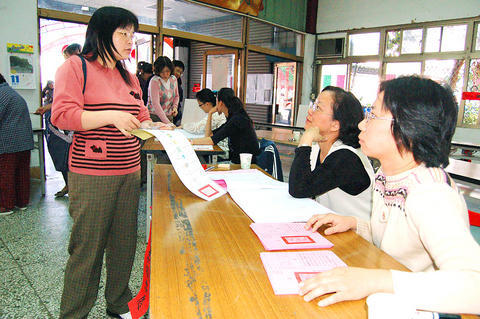Both referendums proposed by the Democratic Progressive Party (DPP) and the Chinese Nationalist Party (KMT) suffered defeat yesterday.
Out of 17,277,720 eligible voters in nationwide, for the DPP's proposal, the turnout was 26.34 percent. A total of 4,550,881 people voted on it with 3,891,179 affirmative votes and 363,494 negative votes.
For the KMT's proposal, the turnout was 26.08 percent. A total of 4,505,927 people voted on it with 2,304,136 affirmative votes and 1,656,890 negative votes.

PHOTO: OU SU-MEI, TAIPEI TIMES
According to Referendum Law (
The KMT's referendum aimed to empower the Legislature Yuan to set up a special investigative committee to probe any questionable finances of the president and high ranking government officials.
The referendum launched by the DPP called for regulations on the disposition of assets improperly obtained by political parties.
Commenting on the DPP's failed referendum bid, KMT Chairman Wu Poh-hsiung (
"If the KMT had any illegal assets, the judiciary system can charge us with wrongdoing at any time. But the truth is, we have reported our assets as required by the Control Yuan," he said, adding that it is a "monumental joke" to keep smearing the party.
necessary
Contrary to the pan-blue leaders' call to boycott yesterday's referendums, Demos Chiang (
In his latest entry on his blog baimu yiyan (
He said his support for the referendum is without any bias towards a particular camp, but because the referendum is the "most civilized mechanism that has happened in the history of democracy" and it is also the highest form of respect that politicians can pay for the people's right to choose.
No comments were available from DPP headquarters at press time on the failure of its proposed referendum.
Earlier yesterday however, DPP Secretary-General Cho Jung-tai (
"Their behavior is tantamount to rejecting democracy," Cho said. "They set a very bad example for Taiwan and the world. The message they send is that Taiwan is a country where the people cannot enjoy the right to referendum and that a referendum is like a dreadful monster."
DPP Legislator Shen Fa-hui (
Shen said they received complaints that some election personnel hinted to voters that they did not need to pick up the referendum ballots. Some simply told them flat out that they did not need to do so.
setup
Some called out the names of voters picking up the referendum ballots and the setup at some polling stations violated the Central Election Commission regulations, he said.
Shen encouraged voters encountering such problems or any other obstruction at polling stations to immediately report the situation to authorities. He also called on investigators to take the initiative to collect evidence and launch an investigation into any complaints.
Additional reporting by Ko Shu-ling

Chinese Nationalist Party (KMT) Chairman Eric Chu (朱立倫), spokeswoman Yang Chih-yu (楊智伃) and Legislator Hsieh Lung-chieh (謝龍介) would be summoned by police for questioning for leading an illegal assembly on Thursday evening last week, Minister of the Interior Liu Shyh-fang (劉世芳) said today. The three KMT officials led an assembly outside the Taipei City Prosecutors’ Office, a restricted area where public assembly is not allowed, protesting the questioning of several KMT staff and searches of KMT headquarters and offices in a recall petition forgery case. Chu, Yang and Hsieh are all suspected of contravening the Assembly and Parade Act (集會遊行法) by holding

PRAISE: Japanese visitor Takashi Kubota said the Taiwanese temple architecture images showcased in the AI Art Gallery were the most impressive displays he saw Taiwan does not have an official pavilion at the World Expo in Osaka, Japan, because of its diplomatic predicament, but the government-backed Tech World pavilion is drawing interest with its unique recreations of works by Taiwanese artists. The pavilion features an artificial intelligence (AI)-based art gallery showcasing works of famous Taiwanese artists from the Japanese colonial period using innovative technologies. Among its main simulated displays are Eastern gouache paintings by Chen Chin (陳進), Lin Yu-shan (林玉山) and Kuo Hsueh-hu (郭雪湖), who were the three young Taiwanese painters selected for the East Asian Painting exhibition in 1927. Gouache is a water-based

Taiwan would welcome the return of Honduras as a diplomatic ally if its next president decides to make such a move, Minister of Foreign Affairs Lin Chia-lung (林佳龍) said yesterday. “Of course, we would welcome Honduras if they want to restore diplomatic ties with Taiwan after their elections,” Lin said at a meeting of the legislature’s Foreign Affairs and National Defense Committee, when asked to comment on statements made by two of the three Honduran presidential candidates during the presidential campaign in the Central American country. Taiwan is paying close attention to the region as a whole in the wake of a

OFF-TARGET: More than 30,000 participants were expected to take part in the Games next month, but only 6,550 foreign and 19,400 Taiwanese athletes have registered Taipei city councilors yesterday blasted the organizers of next month’s World Masters Games over sudden timetable and venue changes, which they said have caused thousands of participants to back out of the international sporting event, among other organizational issues. They also cited visa delays and political interference by China as reasons many foreign athletes are requesting refunds for the event, to be held from May 17 to 30. Jointly organized by the Taipei and New Taipei City governments, the games have been rocked by numerous controversies since preparations began in 2020. Taipei City Councilor Lin Yen-feng (林延鳳) said yesterday that new measures by